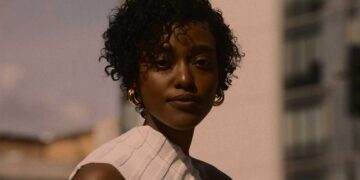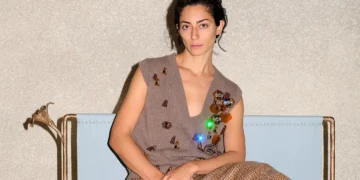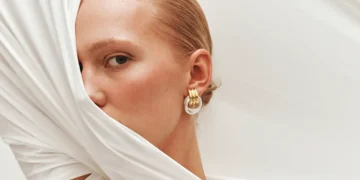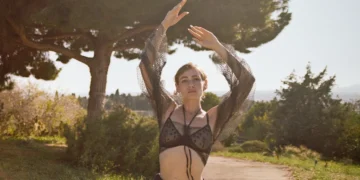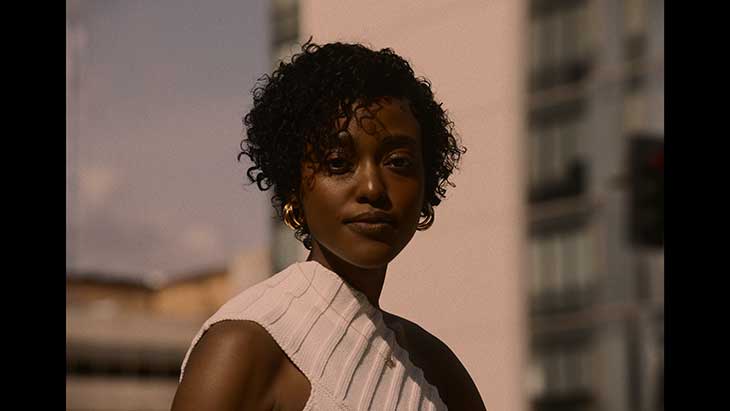
Arsema Thomas, known for their breakout role in Netflix’s Queen Charlotte – A Bridgerton Story, is a rising star with a uniquely global perspective shaped by an upbringing across multiple continents. Their portrayal of a young Lady Agatha Danbury earned them critical acclaim and an NAACP Image Award nomination, signaling the arrival of a fresh, dynamic voice in television.
With their feature film debut in Hulu‘s She Taught Love, Arsema continues to explore compelling narratives that highlight the complexities of the Black experience. The film, directed by Nate Edwards, sees Arsema in the lead role of Mali Waters, opposite Darrell Britt-Gibson. As She Taught Love enters its first weekend in theaters and on Hulu, Arsema’s performance is already making waves, signifying yet another standout moment in their growing career.
INTERVIEWS
In this exclusive interview with Editor Anastasija Pavic for DSCENE Magazine, Arsema Thomas opens up about how their diverse upbringing has shaped their sense of self and identity. They reflect on a transformative acting experience that deepened their understanding of resilience and independence, and also hints at the personal connections they bring to each role, leaving much to anticipate for what’s next.
What was the pivotal moment when you knew acting was your true calling?
I don’t think that moment has come yet or will ever come, I think I have been trying to find out what is the most effective way to follow my purpose, which has been to create and foster a space that allows Black people self-actualisation and self-acceptance to then allow a space for love, and I have realized that media is the best way to do so. I have always enjoyed acting, and I am just blessed that it happens to be an effective part of my purpose. But I have to be flexible because the purpose is the first priority, how I achieve must not be static.
With such a rich cultural upbringing across different countries, how has your sense of home evolved over the years, and where do you feel most grounded?
I always thought of home as a physical space, something you can point to, but living in a limbo state, between places, with nothing cementing my identity, I realized how fallible language is, and that I can define « home » for myself. At the moment my home is where my mother is.
In “Queen Charlotte,” you portrayed a young Lady Agatha Danbury navigating a complex marriage. What did you learn from playing her?
I learned that women have been defined by the relationships they have rather than being able to stand independently as fully-fledged human beings, and Agatha taught me that. She is smarter than her partners, she is more empathetic, and she doesn’t allow the men she loves to play a role in how she sees herself, or how she defines herself. Her ability to drive toward her goal of equal opportunity feels like the engine of the machine that is Lady D, and her lovers are just these nice accessories, never distracting her from her love of all humanity.
Прикажи ову објаву у апликацији Instagram
You’ve spoken about using your grandmother’s arranged marriage as inspiration for Lady Danbury. How do you integrate personal stories into the fictional characters you portray?
Personally, I enjoy research, and any chance to get first hand accounts of similar situations that are so far from my reality, I relish in it. Perhaps the symptom of a narrow imagination, but I love being able to investigate all the possible emotions one would feel, and I enjoy specificity. Lady Danbury doesn’t only feel imprisoned, but it is a type of imprisonment that she has lived with, made due with, one that is not socially a taboo, but one she ends up not agreeing with, all these variables make the equation extremely specific. Also the fictionality of Agatha cannot be part of the equation, she must feel and move and sound like a real human being with the same levels of nuance as you and I, and to make sure that no rock is overturned, I lean on the everyday examples around me.
“I think that so much of the stories that are coming out of Hollywood are dressed up in ways that seem revolutionary but in reality lack any critical analysis of the status quo that continues to oppress and marginalize the majority of us. I want to expose so much, I want to create work that makes people think differently and see each other for the first time.”
“She Taught Love” marks your debut as a film lead. How did you connect with the character of Mali Waters?
Mali is similar to Agatha, they are both women who have built their walls up to protect themselves. Both of these women feel so distant to me, which makes it a beautiful challenge to embody and see what naturally works and what I have to massage to seem organic for me. I am a naturally open and trusting person, and it is never about shutting that part off, but dialing it down to a space that makes sense for these characters. I also connected with Mali’s relationship with her father, we are similar in that we find our best friends in our dads, and I always think that if my father were here to see me at this age, we would have a relationship similar to theirs. Mali also represents a lot fo the women that I have been able to privilege off of, who have gotten me here, the Black women who take everybody else’s stress and heap it onto their plates. I am the daughter of these women and their sister and friend, and Mali just feels like a thank you note and love letter to them. These women deserve to see their narratives told through the medium of cinema, just like everyone else, but they are constantly overlooked. Mali is my way for paying the way forward.
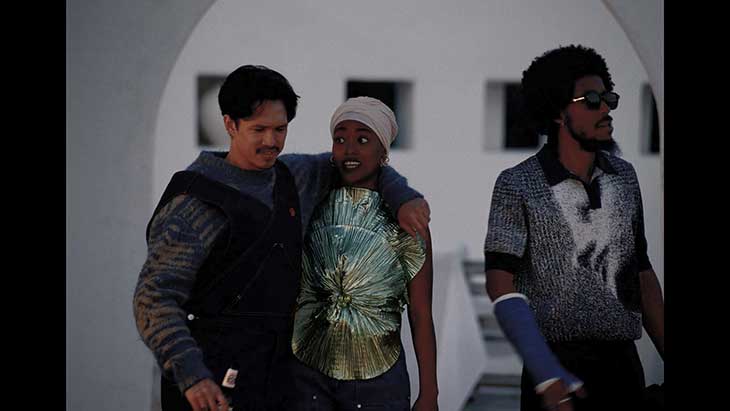
What’s the most valuable piece of advice you’ve received on set?
The most valuable piece of advice I received was to always trust in what my spirit is telling me. This was advice Darrell gave me during a moment when I felt as though I couldn’t bring the project to the home plate, as though they had made a mistake in choosing me to carry the Mali Waters name. It’s advice that my mother later repeated during press for the film, when I started to doubt whether or not I deserved everything that is about to happen with this film. The spirit, the gut, these are undeniable sources of information that I squashed out of myself to make room for external validation, but the flame is not yet extinguished completely.
As someone who is also deeply involved in social causes, how do you hope to use your platform in Hollywood to bring attention to issues that are important to you?
I hope that I don’t have to silo my mission and my career, I hope that they work in tandem with each other. I think that so much of the stories that are coming out of Hollywood are dressed up in ways that seem revolutionary but in reality lack any critical analysis of the status quo that continues to oppress and marginalize the majority of us. I want to expose so much, I want to create work that makes people think differently and see each other for the first time. I want to be a part of more projects that prioritize the idea of loving one another rather than pitting us against each other, and I want to be part of truth telling and using history to create different futures. I want to be part of the journey into the unknown rather than fueling the cycles we currently find ourselves in.
“I think the only thing that motivates me is the sole fact that I have no other option, there is no other alternative. If I am not pushing boundaries, that I feel as though I have lost all reason and purpose to do anything at all.”
How do you mentally prepare for roles that demand intense emotional performances?
I think that as someone who battles with mental health issues, I rely a lot on my drama school training to keep me safe, and I have an amazing therapist and meditation practice that keeps me grounded in myself. The moment I know that something deep needs to be extracted from me, I have to ensure that the foundation is strong enough to hold such a story, and so my preparation starts long before I step onto set. For She Taught Love, I had the amazing opportunity of spending two weeks at a convent in Southern Georgia with my mother, my aunts, and my sister. There was something about strengthening my spirit, and being in nature and solitude that made it easy to engage with intense emotions from a place of respect and reverence, knowing that it is part of the human condition and that it is necessary to show Black people having a myriad of emotions, because we are human as well, but are constantly pressured to hide our vulnerabilities. That is part of the radicalism about intentional Black representation.
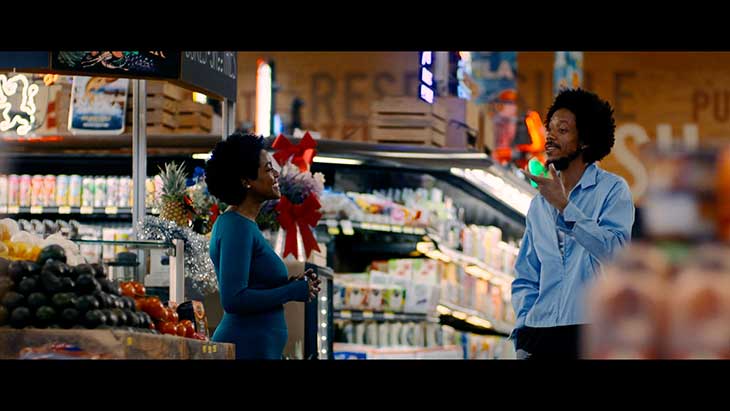
What kinds of narratives do you feel the entertainment industry still needs to explore?
That is such a tough question, and I think the entertainment industry needs to delve into narratives that live at intersections, because it is at those nodes that we see the complexity of the human experience, and we are able to then engage with characters that we overlook in our daily lives, with empathy and humanity. I think the industry needs to stop being scared of the unknown, or the stories they’ve never seen before, like She Taught Love, and realize that that is where art truly lies, in uncovering something new. But most of all, I think the industry has to move away from using trauma as the central focus of the narratives of the marginalized and oppressed. I think the moment that we no longer give the leading role to the struggle of being oppressed and towards the individuality and humanity, I feel as though the entertainment landscape will truly change.
At the end of the day, what motivates you to keep pushing boundaries?
I think the only thing that motivates me is the sole fact that I have no other option, there is no other alternative. If I am not pushing boundaries, that I feel as though I have lost all reason and purpose to do anything at all. I am not satisfied doing anything that continues the same climate that I find society at, and I think the idea that this is not a fight that ends with me, and its not a journey that one takes in solitude keeps me happy. This is a community embedded battle, and everything is better with a community by your side.
